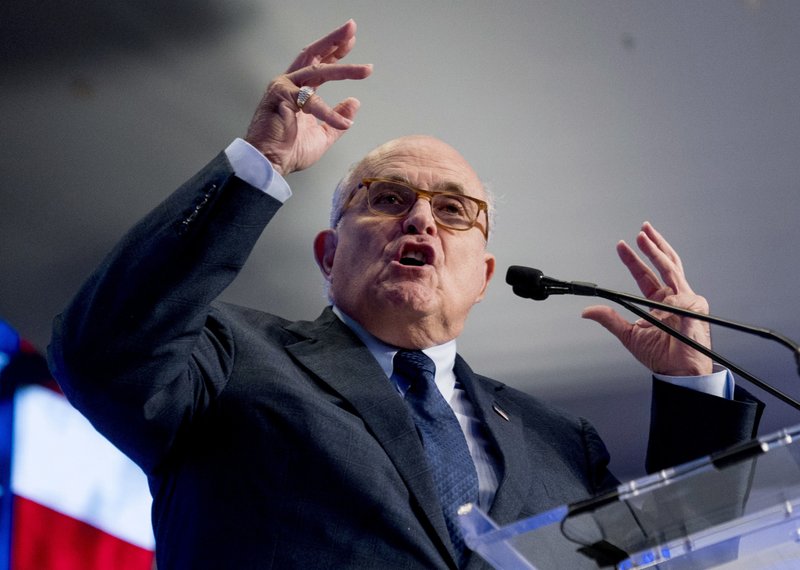
Former FBI Director James Comey once compared a meeting with President Donald Trump to “Sammy the Bull’s Cosa Nostra induction ceremony” and said Trump’s demeanor gave him flashbacks to his “earlier career as a prosecutor against the Mob.”
But it’s not just Trump’s critics who compare his Administration to the mafia. Indeed, Trump and his allies have also made repeated mob references — when defending themselves.
In a tweet Wednesday morning, Trump compared his former campaign manager Paul Manafort’s trial on tax and fraud charges to legendary gangster Al Capone, the second time in recent days he explicitly compared Manafort to Capone, who was brought down on tax charges.
In an interview with Fox News in mid July, he said something similar: “With Paul Manafort, who clearly is a nice man. You look at what’s going on with him. It’s like Al Capone.” And in a tweet in June, he sarcastically wrote that he “didn’t know Manafort was the head of the Mob.”
Presidential scholars say the comparison is a strange one for a president to make about his own former campaign head, especially when he’s on trial, while also showing a basic misunderstanding of Capone’s role in history.
“Donald Trump’s bizarre comparisons between his former campaign advisor Paul Manafort and Al Capone reveal the president’s all-too-familiar ignorance of history — this time the Prohibition Era,” said Barbara Perry, the director of presidential studies at University of Virginia’s Miller Center.
“Yes, the feds had to settle for a tax evasion conviction against Capone to get the murderous crime boss off the streets. But why would Trump want to equate Manafort with one of the most notorious gangsters in American history?” she continued.
Trump and his allies have also used the language of mob trials when describing Special Counsel Robert Mueller’s investigation into Russian meddling in the 2016 election, especially the common practice of prosecutors going after associates of a mob boss in hopes of getting them to cooperate in the investigation.
In a tweet in April, Trump criticized stories in the New York Times about his former personal lawyer, Michael Cohen, saying reporters were “going out of their way to destroy Michael Cohen and his relationship with me in the hope that he will ‘flip.'”
“Most people will flip if the Government lets them out of trouble, even if it means lying or making up stories,” he tweeted.
Trump’s personal attorney, former New York City mayor and federal prosecutor Rudy Giuliani, has used similar language.
In one interview, he compared tapes Cohen secretly made of conversations with Trump to recordings of mobsters he listened to as a federal prosecutor. “How about 4,000 hours of mafia people on tape? I know how to listen to them. I know how to transcribe them. This tape is crystal clear when you listen to [it]. I’ve dealt with much worse tapes than this,” he said on Fox News.
At other times, Giuliani has said that Mueller is pursuing a “big fish” — e.g. the president — trying to force Manafort to “give up Donald Trump.” And he’s compared Cohen’s apparent willingness to talk about Trump’s secrets to someone who’s turned state’s witness out of self interest. “All of a sudden it appears now when he’s maybe going to go to jail and singing for himself,” he said.
Trump’s former attorney, Jay Goldberg, also warned the president about Cohen in April, explicitly comparing it to a mob prosecution, even as he said he didn’t think Trump had broken any laws. “The mob was broken by Sammy ‘The Bull’ Gravano caving in out of the prospect of a jail sentence,” he told the Wall Street Journal.
Although not explicitly about the mafia, many of Trump’s defenders have also reached for similar language about the importance of loyalty, something Trump is said to prize.
In one interview, Anthony Scaramucci, who served as the White House director of communications for 11 days, said Cohen would not cooperate with prosecutors against Trump because he is “a very loyal person.” Trump’s longtime unofficial advisor, Roger Stone, said in a video he posted online that he would “never roll on Donald Trump.”
Giuliani also had a revealing moment in an interview on CNN. After he called Cohen a habitual liar, host Chris Cuomo pressed him on the fact that Trump had hired Cohen in the first place. Giuliani said that making mistakes is only human, but his response didn’t hinge on Cohen’s lying, but rather on his loyalty.
“That’s kind of part of the human condition,” he said. “We all make mistakes about people who turn out to be disloyal to us.”
Experts on the presidency say that Trump’s emphasis on loyalty and his analogies to mafia leaders are related to his vision of a strong president.
“You could say that Trump — since the beginning — has been acting as a strong leader or strongman, who could cut through the constraints of a complex constitutional government and fix things,” said Sidney Milkis, an expert in political parties, politics and the presidency at the Miller Center, though he said he could only speculate on Trump’s reasoning.
But Perry suggested Trump was on stronger ground with his other frequent historical analogy, calling the investigations a “witch hunt.” “At least the women killed for being witches were truly innocent,” she said.
More Must-Reads From TIME
- The 100 Most Influential People of 2024
- The Revolution of Yulia Navalnaya
- 6 Compliments That Land Every Time
- What's the Deal With the Bitcoin Halving?
- If You're Dating Right Now , You're Brave: Column
- The AI That Could Heal a Divided Internet
- Fallout Is a Brilliant Model for the Future of Video Game Adaptations
- Want Weekly Recs on What to Watch, Read, and More? Sign Up for Worth Your Time
Write to Abby Vesoulis at abby.vesoulis@time.com